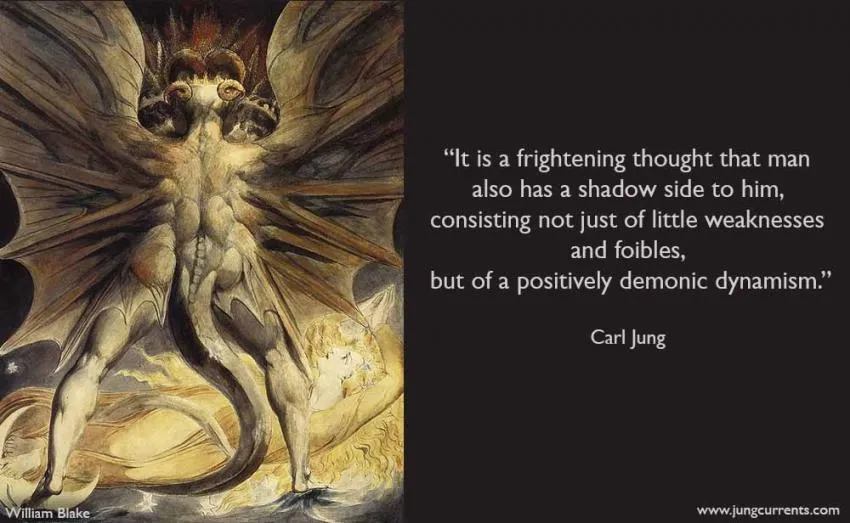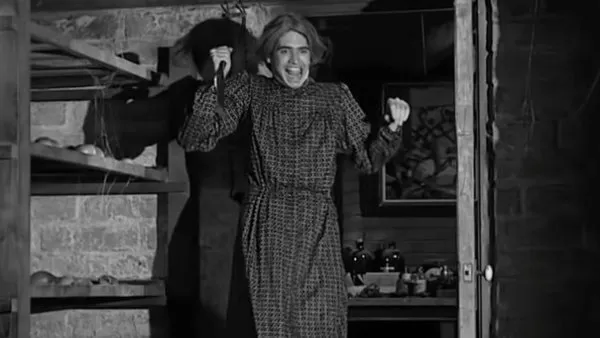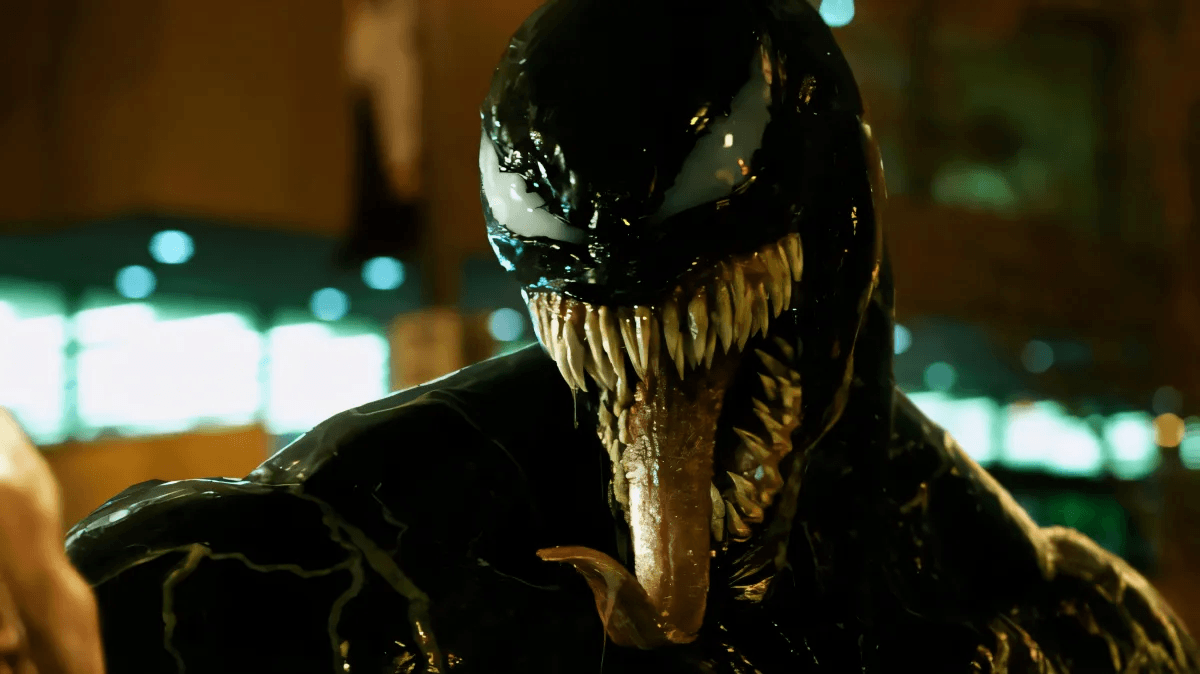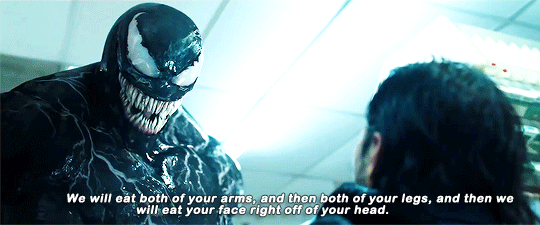How Venom Is Eddie's Shadow Self

In the craft of storytelling, there’s this thing called the "shadow," which is essentially a character that the “hero” has to confront if they want to overcome an obstacle, achieve growth, and reach their goals.
The character is often a “villain,” but they embody the problematic parts that belong to the hero, which get ignored by subconscious suppression. But the term "shadow" came from Carl Jung's work in psychology and his concept of “shadow work” which was built from Freud's work on repression.
If you’re unfamiliar with the “shadow self,” know that it is the self that’s suppressed from the conscious mind. This is because the shadow self is the negative emotions, thoughts, and behavior that a person is unaware of because they don’t want the negative traits associated with them, but they can surface when a person is triggered. But because they suppress their shadow self so much, they won’t remember their hurtful actions or words after the triggering event has passed.
In other words, the shadow self is the harmful and toxic part of our personalities that we hid away in our subconscious. With that said, the purpose of shadow work is to become aware of our shadow self by confronting and tracing our thoughts, emotions, and behavior through journaling, so we could be able to consciously address our issues. For many people, this means understanding their trauma, making shadow work an emotionally painful process of healing.
This is important though because sometimes people are so traumatized that they develop a split personality. However, The second personality is often not harmful, making the phenomenon confusing. Yet the split personality is used and called The Double in psychological literature and movies under the drama and horror genres.
The Double is basically the shadow self of the main character, but Freud proposed different theories on how the double functions. The most popular theory that people love and support is the theory that the double is the character’s unconscious mind, or aka the shadow self.
I know that sounds redundant, but I’d like to be clear that it was one of Freud’s theories. The other involved the idea of immorality, that the double is a form of self-preservation from “the destruction of the ego” that’s just “energetic denial of the power of death,” which becomes the reminder of death after the double pass their phase of immorality.
This death was originally believed to be the double becoming the conscious mind of the character as the sole personality of the person, which is part of the theory that the double is the character’s unconscious mind, but a majority of stories don’t display this death and separate these theories into two.
However, an example of the two theories being one is the film Psycho by Alfred Hitchcock since the double of Norman Bates takes over his conscious mind and becomes his sole personality, which sadly was the identical personality of his deceased mother.

But then there’s the classic example of "The Strange Case Of Dr. Jekyll and Mr. Hyde" that was published in 1886 by Robert Louis Stevenson, that actually involves real death since Hyde kills himself when he can’t go back to his original self as Jekyll.
Today, stories like The Nutty Professor and The Hulk don’t involve the death bit and keep the double as the subconscious. In addition, there seems to be a self perversion of the original self since Sherman and Bruce are conscious and address their problems.
While Buddy Love was removed from Sherman, he learned valuable lessons from his existence. But Bruce is someone that’s the perfect example of anger management since Bruce had to learn what and why certain things trigger the Hulk to appear to be able to use his anger and strength whenever he was needed, showing that the shadow self (negative traits) can be used in a positive way. With that said, I want to say how Venom is the same.

I know it's kinda weird thinking of Venom as a sort of double, knowing he's an alien symbiote from outer space, but that's why he is a double. A symbiote is an organism that cannot live without a host or partnership. That doesn't necessarily mean a takeover, since there are different types of symbiosis.
The symbiosis that occurs between Venom and Eddie is called Mutualism, which is where both organisms get benefits from their relationship. In real life, this can look like the relationship between sharks and pilot fish since the fish get rid of any parasites on the shark and clean away fragments of food from their teeth. In return, the shark provides the pilot fish protection from predators.
Between the characters, Venom benefits from being with Eddie since he literally needs a host's metabolic system to eat and digest his meals while Eddie’s life span is extended since he suffers from cancer. Venom can’t cure it, but he does slow down the process. Yet ironically, hosting Venom is equally killing Eddie since he’s a parasite, so the symbiosis relationship might actually be parasitism.
While I love this biological understanding in character creations like Venom, there's an added layer of complexity with making Venom need a compatible host like an organ transplant. Venom so happens to be compatible with Eddie, but why?
The actor Tom Hardy has said it’s because Eddie is a professional coward, making it easy for Venom to push him around. However, I think it’s because Venom sees himself in Eddie. Venom constantly calls Eddie a loser, so why stay with him? Towards the end of the film, it’s revealed it's because Venom is also considered a loser where he comes from.
But how is Venom Eddie’s double? Eddie is a reporter who likes seeking truth and justice. He may have gone about it the wrong way with Drake, but the intention was there. In fact, how he handles his confrontation with him shows how ill-prepared he is when confrontations happen, showing he’s quite a harmless person trying to be powerful with his occupation.
This is especially true outside his occupation since we see Eddie be nonconfrontational when refuses to tell his noisy neighbors to lower their volume until Venom comes along to scare them to listen to him.
In other words, once Venom entered Eddie’s life, he gain the capability to help himself and other people. Venom might be violent about it, but Eddie will take whatever he can get, though I think the power he feels from Venom is probably the thing he likes the most about being with him.

Because of this, Eddie’s shadow self is someone who feels powerless, making him feel like a loser. He might not have the ability to help people, but once he experiences Venom’s power, he puts him in check only allowing Venom to hurt and eat bad people. Eddie’s shadow/double, aka Venom, may also like hurting people since it’s what makes them feel powerful, but I’m unsure about this theory.
My opinion about Venom might be reaching, but it should be noted that a shadow self can also be hurt. They don’t have to be outright evil, sometimes the shadow self is the broken side, someone who feels unimportant, insecure, a loser, an outcast, and more.
Eddie’s shadow feels powerless which also makes him feel like a loser, but he doesn’t feel this consciously. Instead, Venom had to tell him what he really thinks of himself, which is the same opinion Venom holds of himself since he felt powerless in comparison to everyone else from his planet, like Riot.
With this in mind, I hope you can start noticing which characters are the protagonist's shadow self or double.
Opinions and Perspectives
This analysis helps explain why their dynamic feels so authentic despite being so unusual.
The idea of facing our shadow self through external means is fascinating.
Such a clever way to explore the concept of shadow self in modern storytelling.
This analysis shows why their relationship works beyond just the typical hero-villain dynamic.
Makes me think about how we all have parts of ourselves we need to integrate.
The idea of confronting our shadow self through external forces is really powerful.
I see why Eddie and Venom's relationship resonates with so many people now.
This kind of depth is exactly what makes superhero movies more than just action films.
Never thought about how Eddie's cancer plays into their psychological dynamic.
This analysis gives me a whole new appreciation for the character development.
The loser connection between them is such a humanizing element of their relationship.
Really shows how complex character relationships can be in superhero films.
Their relationship is such a perfect metaphor for internal struggle and growth.
I appreciate how the article explains shadow work in an accessible way through this example.
The idea of conscious versus unconscious control adds another layer to their struggles.
Makes me wonder if other superhero stories have similar shadow self dynamics we've missed.
The comparison to therapy is spot on. Sometimes we need something to force us to face ourselves.
Interesting how Eddie's character growth comes through accepting rather than fighting his shadow self.
The concept of mutualism versus parasitism really captures their complex relationship.
The way they balance each other out is really well done. Eddie's morality with Venom's power.
Never considered how Venom might represent Eddie's suppressed desire for confrontation.
I think this is why the humor in the movie works so well. It's like watching internal dialogue externalized.
The power dynamic is really interesting. Neither is truly in control but they have to work together.
This analysis helps explain why their relationship feels so natural despite being so bizarre.
Fascinating how Eddie's profession as a journalist seeking truth parallels his journey of self-discovery.
The biological and psychological aspects complement each other so well in this story.
Really makes you think about how we all have different sides to our personality.
I love that this isn't just about good versus evil but about integration and acceptance.
The part about trauma and split personalities adds another layer to understand their relationship.
Never thought I'd be thinking about Jungian psychology while watching a superhero movie!
Interesting how Venom helps Eddie become more assertive while Eddie helps Venom become more controlled.
The idea that our shadow self isn't necessarily evil but could be our hurt side is really powerful.
This makes me want to rewatch the movie with this psychological framework in mind.
I'm seeing some parallels with Fight Club here too. Another story about confronting your shadow self.
The comparison to organ transplant compatibility is fascinating. Like they were meant to find each other.
This explanation of shadow work really puts the whole story in perspective. It's about growth through confrontation.
Love how the article connects modern superhero films to classic literary concepts like Jekyll and Hyde.
I always thought Venom was just a fun action movie but this analysis adds so much depth.
The parallel between their loser status in their respective worlds is something I totally missed when watching.
Makes me think about my own shadow self. Maybe we all need a Venom to help us face our fears.
I particularly appreciate how the article explains the difference between the shadow self and The Double concept.
The power dynamic between them is fascinating. Eddie tries to control Venom but also relies on that power.
Wonder if the writers consciously included all these psychological elements or if it just naturally evolved.
This article really helped me understand why the movie works so well on a psychological level.
The whole loser aspect hits hard. Sometimes we need someone else to point out our self-defeating thoughts.
I think that's exactly the point though. Our repressed sides can be pretty extreme when they finally surface.
But isn't Venom too extreme to be just Eddie's shadow self? I mean, he literally eats people!
This reminds me a lot of Jung's work on the shadow self. We all have parts of ourselves we try to hide or suppress.
Absolutely brilliant analysis! Honestly explains why I connected so much with these characters without really understanding why.
The biological symbiosis angle is neat but I think the psychological symbolism is what makes this story really compelling.
I find it interesting how both characters start as outcasts in their own worlds and find strength in each other.
Makes me wonder about the sequel and how this dynamic might evolve. Will Eddie become more integrated with his shadow self?
Not sure I buy the whole shadow self theory but I do love how their relationship evolves from fear to acceptance.
The comparison to Bruce Banner and Hulk really helps understand this dynamic. Both deal with accepting and controlling their darker sides.
I never connected the dots between Eddie's profession as a truth-seeker and Venom forcing him to face his own truths. That's pretty clever writing.
The cancer angle adds another layer to their relationship. Eddie literally needs Venom to survive, just like Venom needs him. Talk about codependency!
Actually disagree with the previous comment. I think Venom is very much a reflection of Eddie's repressed desires. Just look at how naturally they sync up when fighting.
This makes me see the noisy neighbor scene in a whole new light. It's not just comedy, it's about Eddie finally confronting what he fears.
The part about Eddie being a professional coward really resonates. We all have those moments where we wish we were braver, don't we?
I'm not entirely convinced about the shadow self interpretation. Isn't Venom just a separate alien entity rather than a manifestation of Eddie's subconscious?
Anyone else think it's brilliant how Venom forces Eddie to face his own powerlessness? Like therapy but with an alien symbiote.
The mutualism vs parasitism angle is fascinating. I always wondered if Venom was actually helping or slowly killing Eddie. Guess it's both in a way!
Really interesting take on the psychological aspects. I think the comparison to Jekyll and Hyde is spot on, though Venom and Eddie have a more complex dynamic since they actually need each other to survive.
I love this analysis of Venom as Eddie's shadow self. Never thought about it this way but it makes perfect sense, especially how they both view themselves as losers deep down.
